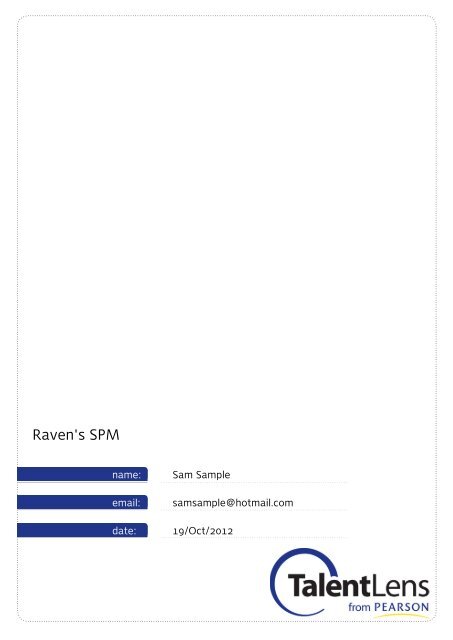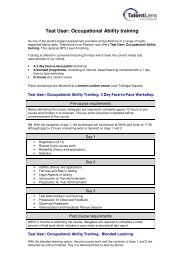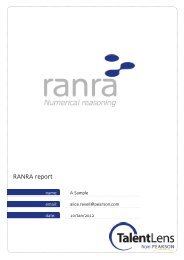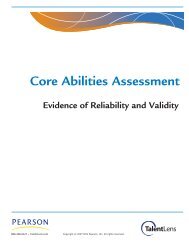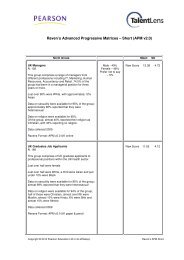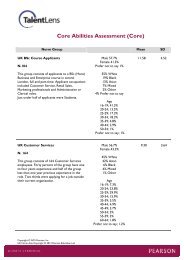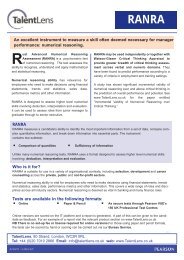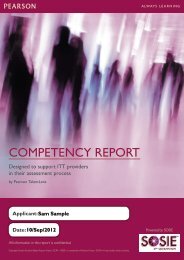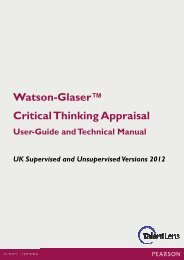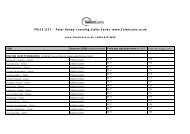Raven's SPM Sample Report - TalentLens
Raven's SPM Sample Report - TalentLens
Raven's SPM Sample Report - TalentLens
- No tags were found...
Create successful ePaper yourself
Turn your PDF publications into a flip-book with our unique Google optimized e-Paper software.
<strong>Raven's</strong> <strong>SPM</strong>name:email:date: date:Sam <strong>Sample</strong>samsample@hotmail.com19/Oct/2012
Overall PerformanceCandidate: Sam <strong>Sample</strong>Norm Group: UK Managers64The bar above shows overall performance on the <strong>SPM</strong> in comparison to UK Managers who have previouslycompleted the test.Total Raw Score: 23Sam <strong>Sample</strong> obtained a total raw score of 23 out of 28 possible points on the <strong>Raven's</strong> Standard ProgressiveMatrices (<strong>SPM</strong>).BackgroundSkills and Abilities assessed with the <strong>Raven's</strong> Standard Progressive Matrices (<strong>SPM</strong>):The <strong>SPM</strong> is a nonverbal mental ability test that requires the solution of problems. The <strong>SPM</strong> measures observationskills, clear thinking ability, intellectual capacity and intellectual efficiency. Specifically the <strong>SPM</strong> measures the abilityto:• formulate new concepts when faced with novel information• extract meaning out of confusion or ambiguity• think clearly about complex situations and eventsThe <strong>SPM</strong> score indicates potential for success in positions that typically require clear and accurate thinking, problemidentification and evaluation of tentative solutions for consistency with all available information. Such positions mayinclude middle management, supervisory and equivalent level technical or professional non managerial positions.The nonverbal aspect of <strong>SPM</strong> minimizes the impact of language skills on performance on the assessment.It is recommended that the <strong>Raven's</strong> <strong>SPM</strong> be used in combination with other assessment techniques.nameSam <strong>Sample</strong> page 2©Pearson Education Ltd or its affiliate(s). All rights reserved. Adapted by permissionwww.talentlens.co.uksamsample@hotmail.com - 19/Oct/2012 Assessment powered by Getfeedback © 2012
BackgroundSkills and Abilities assessed with the <strong>Raven's</strong> Standard Progressive Matrices (<strong>SPM</strong>):The <strong>SPM</strong> is a nonverbal mental ability test that requires the solution of problems. The <strong>SPM</strong> measures observationskills, clear thinking ability, intellectual capacity and intellectual efficiency. Specifically the <strong>SPM</strong> measures the abilityto:• formulate new concepts when faced with novel information• extract meaning out of confusion or ambiguity• think clearly about complex situations and eventsThe <strong>SPM</strong> score indicates potential for success in positions that typically require clear and accurate thinking, problemidentification and evaluation of tentative solutions for consistency with all available information. Such positions mayinclude middle management, supervisory and equivalent level technical or professional non managerial positions.The nonverbal aspect of <strong>SPM</strong> minimizes the impact of language skills on performance on the assessment.Score InterpretationYour performance on <strong>Raven's</strong> Standard Progressive Matrices (<strong>SPM</strong>) is given in relation to that of UK Managers whohave previously completed the test. This was deemed to be the most relevant comparison group and should beconsidered when reviewing your results below.Your score was better than or equal to 64% of UK Managers. Compared with others in the specified group you arelikely to demonstrate average range of perception and clear thinking necessary to extract meaning out of confusion andambiguity. This may be apparent in:• defining problems and situations clearly and objectively• distinguishing subtle relationships among situations, events or ideas• building strong arguments by integrating all pieces of relevant information from diverse perspectives• recognising the subtle implications of decisions and actions, and to anticipate likely outcomes• identifying non obvious causes of problems• using all the available relevant information to evaluate and make effective decisions• drawing accurate conclusions from information in any situation• readily learning concepts• developing sufficient insight into issues and situationsnameSam <strong>Sample</strong> page 3©Pearson Education Ltd or its affiliate(s). All rights reserved. Adapted by permissionwww.talentlens.co.uksamsample@hotmail.com - 19/Oct/2012 Assessment powered by Getfeedback © 2012


